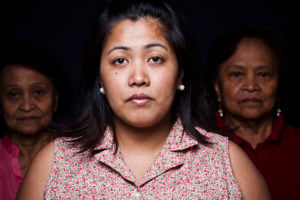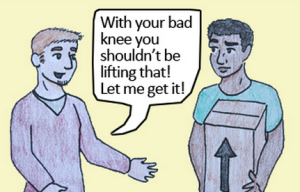Parenting is a lot of very hard work, and trying to parent according to our principles can sometimes feel totally exhausting.
I’m a parent myself – and if I’m being honest – I have to admit that I sometimes find myself cutting corners, sometimes on things I really do care about, just to make it through the day.
If something is desperately urgent, it’ll get done, but many times anything that doesn’t feel like some sort of emergency is going to get bumped down the priority list.
For feminist parents, sharing feminism usually feels urgent for young girls.
Especially for those of us who once were young girls ourselves, we know what they’re up against. We know that to survive in the patriarchy (and to challenge it) they’re going to need some tools and some armor.
From what I’ve seen, feminist parents are generally pretty good about both teaching their daughters about feminism and parenting according to feminist principles.
But what about our sons?
Boys can seem insulated from the harm done by the patriarchy, and that makes it easier to neglect sharing our feminism with with our sons. After all, they have an advantage in this crappy patriarchal system. It seems like they’ll, more or less, be okay.
I’m a working class mom struggling to make ends meet while bringing up a toddler, so I get how hard this stuff is.
Some days it feels like a miracle just to feed my kid three square meals and get him in bed at a decent hour! Some days anything else feels like it’s somehow extra.
But my child needs feminism. He needs feminism desperately, and he needs it even though he was assigned male at birth.
I’ve chosen to make sharing my feminism with him – both by parenting according to intersectional feminist principles and by teaching him about feminism – a priority for my family. I hope that other parents of boys, and children we assume to be boys, will join me and do the same.
If you’re a feminist, and a parent, it’s time to share that with your sons, too.
Here’s five reasons why.
1. The Children We Think of as Our ‘Sons’ Might Not Actually Be Boys
In general, the standard practice (at least here in the US) is to look at a baby’s genitals (either immediately after birth, or on a sonogram while they’re still a fetus) and pronounce them either “a boy” or “a girl.”
This is one of the most difficult topics that I discuss with other parents and caregivers, but it needs to be discussed.
The truth is, you don’t and can’t know the gender of a baby, or even most young toddlers. No matter how we parents feel about it, there is always a chance that our kids won’t turn out to identify with the genders assigned to them at birth.
Gender is complex and multifaceted.
I’m cisgender (meaning that I identify with the gender that was assigned to me at birth) but not everyone is, and there is no guarantee that any one particular child will be.
Any child born could turn out to be transgender, and you (and the kid) might not know right away! It’s also a reality that some children are born intersex and doctors may or may not notice this upon birth.
The fact is that when we say a newborn baby is a boy or a girl, what we’re really doing is predicting their gender, and while sometimes our predictions are right, they’re also sometimes very wrong.
And if your child turns out to be transgender, you also have no way of knowing when your child will know that about themselves and feel ready to talk to you about it.
This is hard for parents to swallow. We want to believe we know our kids better than anyone in the universe.
It’s uncomfortable to think that one of the first things we felt we “knew” about our kids could turn out to be wrong, but sometimes the truth is uncomfortable.
The fact is that some of the kids that get cooed over as “adorable baby boys” turn out to be trans girls, or intersex, or non binary, or something else entirely. We can’t know who our children are until they tell us. All we know is how we’ve chosen to treat them.
It’s easy to assume that our boys are somehow insulated from all the sexism in the universe. That actually isn’t true, but even if it were, the reality is that sometimes the kids we think of as boys aren’t boys at all.
Transgender girls are girls, and they hear sexist messaging just as loud and clear as any cisgender girls do. And while patriarchy is extremely harmful to women and girls, it’s often even worse for nonbinary people and intersex people.
In our family, we work hard to constantly remind ourselves that we don’t actually know our child’s gender.
We use masculine pronouns for him, and he has a more masculine sounding name, but that isn’t necessarily indicative of who he is or who he’ll become.
I encourage other parents to keep a similarly open mind, but not everyone does. The fact is that trans kids, kids who fall outside of the gender binary, and intersex kids all exist, and there’s nothing you can do to somehow ensure that your child is cisgender.
And if the kid you think is your son turns out to actually be a daughter (or have any other gender identity), they’re really going to need intersectional feminism, and all of the tools it has to offer.
The same is true for children we assume to be girls. We don’t actually know who our kids are going to be, and part of supporting them is being ready to be wrong.
2. Dismantling Patriarchy Helps Everyone
Even if your prediction of your child’s gender turns out to be 100% spot on, and he grows from a cisgender boy into a cisgender man, he still needs feminism.
Why’s that? Well, it’s because patriarchy doesn’t just hurt one particular group of people, it hurts everyone.
Cisgender men might have a whole lot more power under the patriarchy than pretty much anybody else, but that doesn’t make them exempt from its harm.
Patriarchy demands that men and boys behave in very specific ways and only express a small range of specific emotions. It punishes men and boys for any behavior or emotional displays that are seen as feminine.
Feminism seeks to dismantle systems of oppression, which includes the oppression of men and boys.
Raising boys according to feminist principles, and teaching them intersectional feminist ideology can not only help them learn not to oppress others but also to stand up against their own oppression.
Boys need and deserve this. They deserve to be able to feel and express the full spectrum of human emotion.
3. Even Cis Boys Have to Interact with People Who Are Unlike Them
No matter who your kid is, even if he somehow manages to avoid being personally harmed by the patriarchy (which is highly unlikely) he’s going to have to interact with people who are harmed by it.
It’s unlikely – to the point of being actually impossible – that a boy will never come in contact with someone who is transgender, someone who is intersex, or someone who is a cisgender woman or girl.
And when our sons do hang out, or make friends, or have romantic relationships with, people who are more hurt by the patriarchy than they are, it’s better for everybody if they know what’s up.
And for those of us who are mothers, or any other kind of parent besides a cisgender father, we may be the first person our kid interacts with who faces more patriarchal oppression than they do.
Personally, I want my kid to know what I’m up against in this life.
And the absolute last thing I want for him would be for him to perpetuate harmful behaviors without realizing it. So I’m committing to both teaching him about intersectional feminism, and parenting from a feminist standpoint.
He lives in this flawed, complicated, world, and as he grows he’s going to get a ton of negative messages. It’s my job, as his parent, to challenge those ideas, and remind him to treat everyone with fairness, compassion, and dignity.
Speaking of which:
4. It Takes All of Us to Dismantle Patriarchy
If we, as feminists, are serious about trying to actually dismantle oppression, we need more than just the people hurt most by it on board.
My kid needs feminism for himself, yes. But he also needs it for other people.
Let’s talk about rape culture for a minute.
Rape culture is insidious. It normalizes and excuses rape, and it makes it more difficult and dangerous for victims to report rape. Rape isn’t just something that happens to women, a person of any gender can be raped, and it’s important to stand up for all victims.
But in addition to that, young boys are often taught toxic masculinity, taught that men raping women is somehow the fault of women, and that it’s okay if they sometimes “can’t help themselves.” It’s uncomfortable to talk about, but those toxic messages can contribute to rape culture and to more actual rapes happening.
Dismantling rape culture, and other dangerous aspects of patriarchy, needs to include boys.
Part of teaching them to be kind and compassionate humans has to be countering these harmful messages. It could just be that the safety of other people is on the line.
5. Teaching Our Kids Our Ideals Helps Us Clarify Them
Have you ever had an experience in which teaching about something helped you to understand it better yourself?
Even if you’ve never formally taught, I think this happens to a lot of us. We sit down to explain an idea to a friend, and then suddenly in our effort to explain it, we’re looking at it a whole lot more closely.
Teaching can help us clarify our own positions, identify holes in our arguments, and boil things down to their essentials.
This is true when when you’re sharing something with your best friend, and it’s true when we share with our kids.
In fact, I’d argue that with young children, sometimes it can be even more helpful because they have less preconceived notions to rely on. When we’re forced to explain the essence of our position, often using simple language and having points we take for granted challenged, we get down to the nitty gritty.
And it starts young!
My kid isn’t two years old yet, but – already – he has a lot of questions about the world around him. Trying to answer him honestly, and explain why his other mom and I think the things we think and do the things we do, has definitely helped me to better understand all kinds of things.
The benefit here is cyclical, too!
When I take the time to explain my principles to my kid, I benefit from that by clarifying my own position, and then he benefits from my having something more succinct to explain next time around, and so on and so forth.
It also creates a climate in our home where he is learning about things like respect and equality in part by being respected as an equal.
This uplifts all of us, and sets a good example for how to treat others.
***
Children who are boys (or children who are assumed to be boys) may appear on the surface to be exempt from a lot of the harm done by our patriarchal society.
The reality, though, is that they need feminism, and especially intersectional feminism, too.
And as feminists parents, it’s our job to share that with them.
[do_widget id=’text-101′]
Katherine DM Clover is a Contributing Writer for Everyday Feminism. She is a mother, recovering fine artist, and a writer focusing primarily on parenting, queer issues, and feminism. She lives in Detroit, Michigan with her wife and child, and their three cats, and she just learned how to make pie crust. Read her blog, Post Nuclear Era, or follow her on Twitter @postnuclear_mama. Read her articles here.
Search our 3000+ articles!
Read our articles about:
Our online racial justice training
Used by hundreds of universities, non-profits, and businesses.
Click to learn more





















